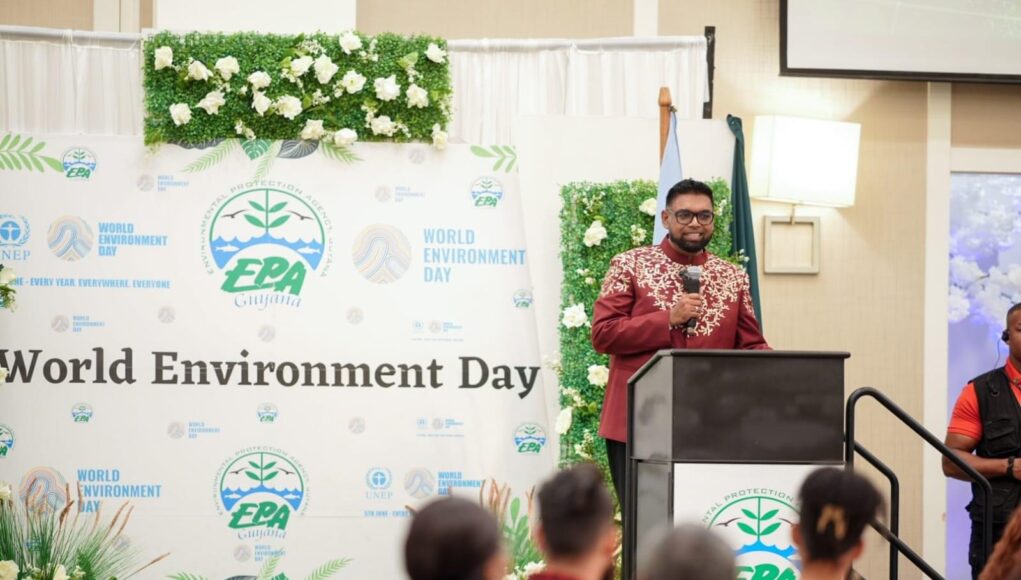During the Environmental Protection Agency (EPA)’s 28th anniversary and awards ceremony last evening, President Dr. Irfaan Ali emphasized the urgent need for the agency to spearhead the development of theoretical and economic models for valuing biodiversity and ecological services. This call to action was central to his address and is reflected in his administration’s strategic vision for positioning the EPA as a key player in Guyana’s development trajectory.
He noted that over the years, Guyana’s oil discovery has significantly shaped the country’s economy and development trajectory. The newfound oil wealth has brought rapid economic growth and development opportunities, but it also underscores the importance of sustainable practices and environmental stewardship.
Reflecting on the EPA’s journey, President Ali noted the agency’s expanded role in national development, which now places it at the center of all major initiatives. He emphasized that this elevated position demands continuous innovation, the application of advanced knowledge, and adherence to regulatory frameworks.
As such, the head-of-state underscored the necessity for the EPA to engage in scientific and practical discussions to craft a clear path forward. He highlighted the absence of global models for these critical services, which makes it imperative for Guyana to take the lead in this innovative endeavor.
“Soon, we’ll have to start discussions on how we create the economic modeling because for biodiversity services and ecological services, there is no formula. There is no modeling as yet globally.
“We have to do a lot of this theoretical work in positioning these as important services globally,” President Ali asserted.
President Ali also pointed out that ecological services, along with climate and biodiversity services, will form an integral part of Guyana’s economic strategy. These services, he argued, will carry substantial economic value on the global stage. He said too that ecological services, climate services, and biodiversity services are valuable assets that Guyana can offer to the world, and they will play a critical role alongside traditional sectors like oil and gas, food security, and infrastructure development.
Highlighting Guyana’s leadership in forest conservation and carbon trading, President Ali celebrated the nation’s rapid progress in these areas. He also praised the collaborative efforts of the EPA in maintaining the integrity of the country’s ecological services.
“In just four years, less than four years, we have managed to regain our position globally. As a leading thinker, a lead activist and elite innovator on forests and forest issues. Guyana has been repositioned once again, in lead position globally. And we should be proud of this.” he noted.
President Ali stressed that the push for environmental sustainability must not come at the expense of the livelihoods of indigenous and riverain communities. He emphasized the need for these communities to benefit from sustainable development policies.
“…That is why the livelihood of the indigenous communities, the livelihood of riverain communities, the livelihood of the people in our country, our fellow by brothers and sisters who live across the country that are heavily dependent on environmental and climate services, that are custodians of those services to a larger extent…
“that they do not have to sacrifice their livelihood or their ability to have equitable development or an equitable opportunity and advancing their life,” he stated.
Looking to the future, President Ali called for the EPA to expand its capabilities and initiate discussions on creating economic models for biodiversity and ecological services. He acknowledged that this would involve pioneering work, as no existing global formulas currently address these services.
“In the model that we are pursuing…the EPA will find itself not only as part of the regulatory body and an oversight mechanism in all the development projects, and all the oil and gas projects, but importantly, as we build out this plan of the economy, which is ecological services and climate services, the EPA will have to continue to expand it wings,” he asserted.













